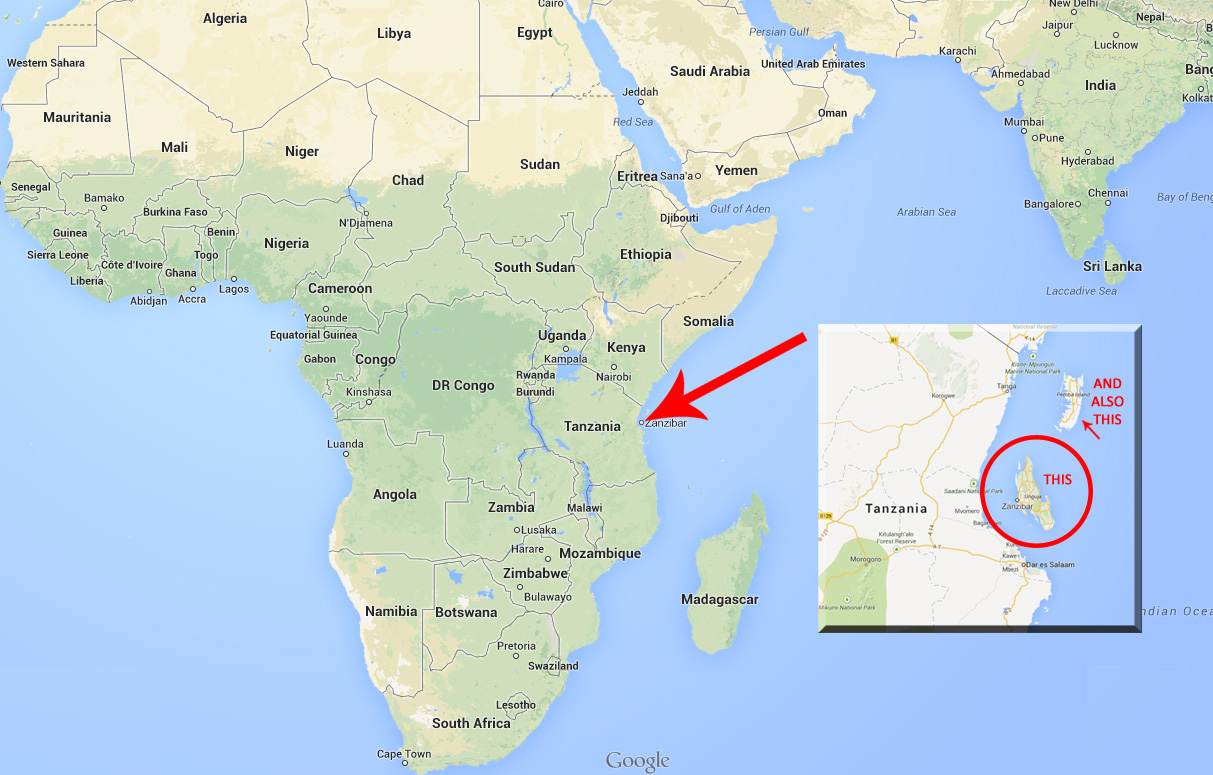ZANZIBAR
The scent of cinnamon will come to you the minute you set foot on the island. The warm breeze through you hair, bare feet on the white sand – an ocean of blue water in fron of you. That is Zanzibar. Perfect for couples, famillies or just yourself. Zanzibar is perfectd ending for a safari in Kenya, Tanzania or South Africa.
ZANZIBAR
The name alone is likely to conjure up images of spice markets, palm-fringed beaches and white-sailed dhows on a turquoise sea – and happily the reality doesn’t disappoint. Lying only a short distance off the Tanzania coast but at the crossroads of Africa, the Middle East and Asia, Zanzibar has long been at the centre of the Indian Ocean experience in East Africa and a Zanzibar holiday is a sensory experience par excellence.
Go on spice tours, taste local dishes and walk the cobbled streets of the capital’s old quarter Stone Town, now a World Heritage Site buzzing with colourful back-street markets and local flavours. And then of course there are the Zanzibar beaches: perfect for anyone who simply wants to enjoy a lazily luxurious beach vacation – Zanzibar and its outlying islands are home to some of the finest beaches in East Africa as well as a number of its best dive sites. You won’t want for somewhere to stay either: one of the world’s most romantic honeymoon destinations, Zanzibar has accommodation that ranges from luxury beachfront cottages to exclusive boutique hotels and elegant spa resorts; parents on the other hand will be delighted by Zanzibar’s family-friendly hotels and safe-swimming beaches.
Accessible from travel hub Dar es Salaam and combining easily with top Tanzania safari destinations such as the Serengeti and Ngorongoro Crater, Zanzibar can be part of a safari and beach tour or as a stand-alone holiday.
WHEN TO GO TO ZANZIBAR
The best time to visit Zanzibar is from June to October during the cool, dry months of spring. Another popular time to visit this tropical island is from December to February when it’s hot and dry.
An African beach holiday means sundrenched shores, palm fringed beaches and glorious sunsets – expect all this and more on a Zanzibar beach escape.
There are two best times to scuba dive off the coast of Zanzibar, in July and August and in February and March. Diving off the north coast is particularly good from June to October and off the south coast between November and March.
We don’t recommend visiting Zanzibar during the two rainy seasons, from mid-March to late May and again in November.
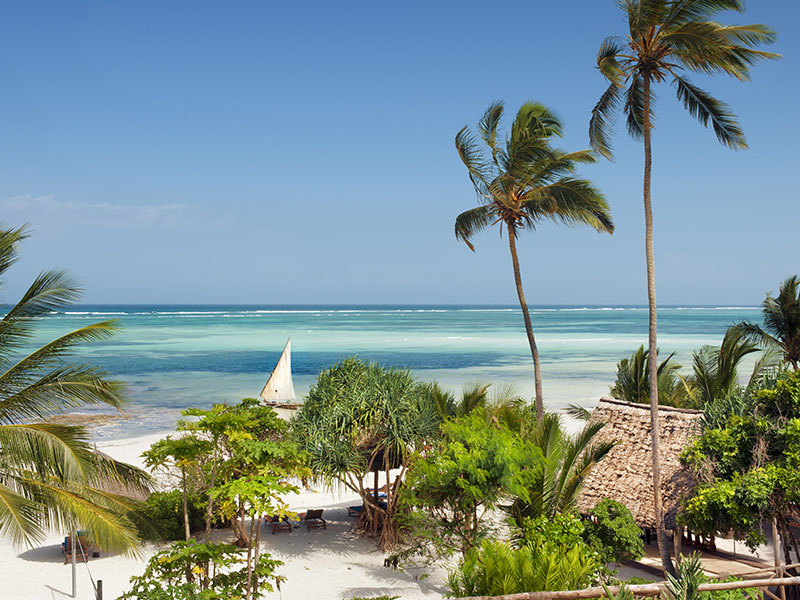
HIGHLIGHTS
StoneTown
 Stone Town is Zanzibar’s historic heart, a bewildering maze of streets and alleyways that form the westernmost tip of Zanzibar Town. These days the island’s bustling capital is home to some quarter of a million people, but lost in the tangle of Stone Town’s narrow streets it’s easy to imagine yourself floating back in time. Twisting passages unfurl beneath delicate balconies as you dodge clattering coffee carts and slip by past ornately carved doors. At three and four stories the buildings tower overhead, leaving just a ribbon of sky between billowing laundry and shutters flung wide. Though first settled by the Portuguese in the 16th century, most of Stone Town’s construction dates to the 19th and (to a lesser extent) 18th centuries – a mesmerising mix of Arabic, Persian, Indian and British architecture – and Victorian era accounts of the quarter carry an authentic feeling to this today.
Stone Town is Zanzibar’s historic heart, a bewildering maze of streets and alleyways that form the westernmost tip of Zanzibar Town. These days the island’s bustling capital is home to some quarter of a million people, but lost in the tangle of Stone Town’s narrow streets it’s easy to imagine yourself floating back in time. Twisting passages unfurl beneath delicate balconies as you dodge clattering coffee carts and slip by past ornately carved doors. At three and four stories the buildings tower overhead, leaving just a ribbon of sky between billowing laundry and shutters flung wide. Though first settled by the Portuguese in the 16th century, most of Stone Town’s construction dates to the 19th and (to a lesser extent) 18th centuries – a mesmerising mix of Arabic, Persian, Indian and British architecture – and Victorian era accounts of the quarter carry an authentic feeling to this today.
The best way to explore Stone Town is on foot, though renting a bicycle is an option if time is short. Hiring a local guide is a great way to discover the hidden histories and lesser known sights and end of Ramadan is especially festive with lanterns lining the alleys and a feast of street food on every corner.
Spice tours can be arranged from your hotel or from one of the many tour operators around town. A variety of tours are available, some including lunch and/or spice cooking classes, but all with the opportunity to head out into the still active plantations and see, touch and taste Zanzibar’s many spices in their natural environment.
From neat, sustainable fashion boutiques to the loud, chaotic market on Creek Street, Stone Town has plenty to offer the dedicated shopper. Look out for brightly coloured kanga and kikois (traditional wrap-around clothing), silver and tanzanite jewellery, handmade leather bags, sandals and shoes, a seemingly endless range of woven baskets, wooden carvings, throws, wall hangings, rugs, antiques and ornaments of all shapes and sizes, not to mention spice-infused beauty products and oils and, of course, the spices themselves.
Stone Town has a number of small but fascinating museums with exhibitions ranging from dhow construction to the evils of the slave trade. Seek out in particular the Palace Museum, Livingstone House Museum, Princess Salme Museum and the House of Wonders (the first building in Zanzibar to install electric lights).
Remember that Zanzibar is a predominantly Islamic society and covering shoulders and legs below the knees is considered appropriate for both men and women. Bars serve alcohol, as do most (but not all) restaurants, and drinking on the street is frowned upon, although not actually illegal.
Pemba
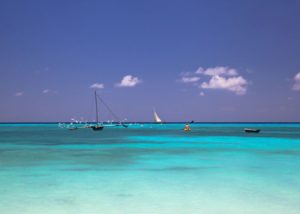
About 50km northeast of Zanzibar Island (more accurately, ‘Unguja’) lies the archipelago’s second largest landmass, Pemba. Pemba has forever been Zanzibar’s most green and fertile isle, and most of the cloves for which Zanzibar is famous are grown here. The annual harvest runs from July to January when the scent of drying cloves lingers on every passing breeze. Most visitors to Zanzibar never make it to Pemba, however, and the island remains far quieter than its big brother Unguja. Accommodation options are also far more limited, but by no means run-of-the-mill. Most fall somewhere between the mid-range and ultra-luxurious, including some of the most spectacular beach resorts Zanzibar has to offer.
Highlights
See Zanzibar’s endemic species: Ngezi Forest Reserve, on Pemba’s north-western tip, is perhaps the best place in the archipelago to see Zanzibar’s indigenous wildlife. A beautiful, unspoilt expanse of forest in its own right, it also hosts the Pemba flying fox (an enormous, but completely harmless fruit bat), various species of monkey and miniature antelope, and Zanzibar’s three endemic bird species, the Pemba scops owl, Pemba white-eye and Pemba violet-breasted sunbird.
Low visitor numbers: Pemba is ideal if you’re looking to escape the crowds. Beaches are quieter, snorkelling reefs barely visited and on the whole the island exudes exclusivity, while still retaining enough accommodation options to suit most budgets.
Mafia Island
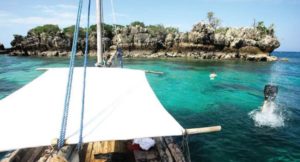
150 km south of Zanzibar Island lies the third largest isle in the archipelago, Mafia. In fact, Mafia Island is so far removed and has so many smaller satellites of its own, that it’s really a miniature archipelago in its own right. Rarely visited, and much quieter even than Pemba, Mafia and its surrounding islands are a diver’s paradise. Huge groupers, rays, turtles and whale sharks all frequent its warm, clear waters and Chole Bay is perhaps the best coral garden in East Africa. Accommodation around Mafia tends to be intimate and upmarket, and for the ultimate in exclusivity, stunning private island lodges are also available.
Mafia is a diver’s paradise. From Chole Bay’s extraordinary coral and fabulously colourful schools of reef fish, to the deeper waters where rays and whale fish roam; Mafia’s archipelago has something for every experience level, but the real wonder is that you’ll probably have it all to yourself!
Mafi is also famous for its turtles: Juani Island, just off the coast of Mafia, is a truly special place to see tiny green and hawksbill turtles dash for the sea. Environmentally sensitive tours can be arranged between June and September, run by an enthusiastic NGO that’s playing a significant role in local turtle conservation.
Matemwe
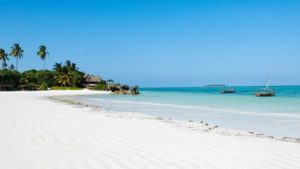 Matemwe, and neighbouring Kigomani, are the northern-most villages on Zanzibar’s east coast. A quiet fishing community under gently swaying palms, Matemwe village lies half concealed behind a modest line of beachfront resorts, which range from simple cottages to plush private villas. An excellent beach spills into a narrow, sheltered lagoon where dhows and outriggers rest on the tide. This is a corner of the island where the slow pace settles in – ideal for those wishing to escape the crowds.
Matemwe, and neighbouring Kigomani, are the northern-most villages on Zanzibar’s east coast. A quiet fishing community under gently swaying palms, Matemwe village lies half concealed behind a modest line of beachfront resorts, which range from simple cottages to plush private villas. An excellent beach spills into a narrow, sheltered lagoon where dhows and outriggers rest on the tide. This is a corner of the island where the slow pace settles in – ideal for those wishing to escape the crowds.
Matemwe is one of Zanzibar Island’s most relaxed destinations – classic palm-fringed beaches, white sand and an emerald sea. The beaches along this stretch are some of the best and quietest on the east coast and the fishing, snorkelling and diving is superb.
Be aware that Matemwe is a working village – fishing and seaweed harvesting are the main industries here and villagers expect to get on with their daily life without camera-toting tourists clicking away. Although remotely situated, Matemwe is easy to reach. Private transfers take little more than an hour from Zanzibar Town.
Our favorite places in ZANZIBAR
WATCH THE VIDEO
WHAT ARE YOU WAITING FOR?
Contact us if you’re ready to book your safari or to get additional information.


